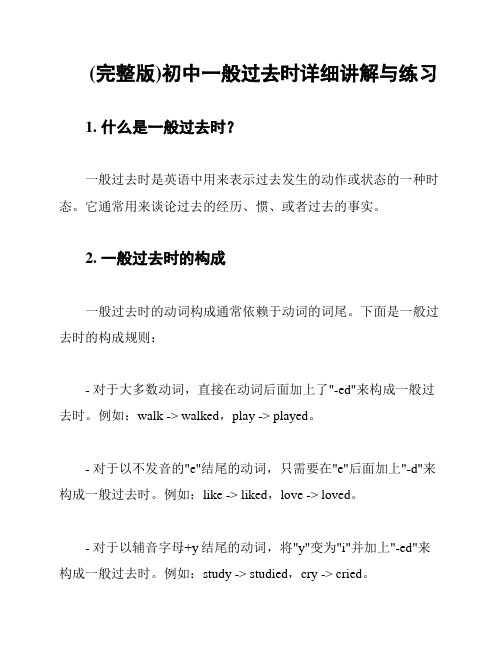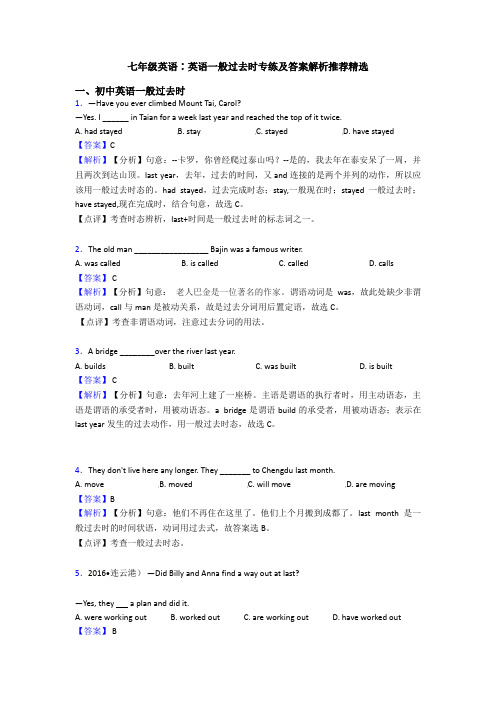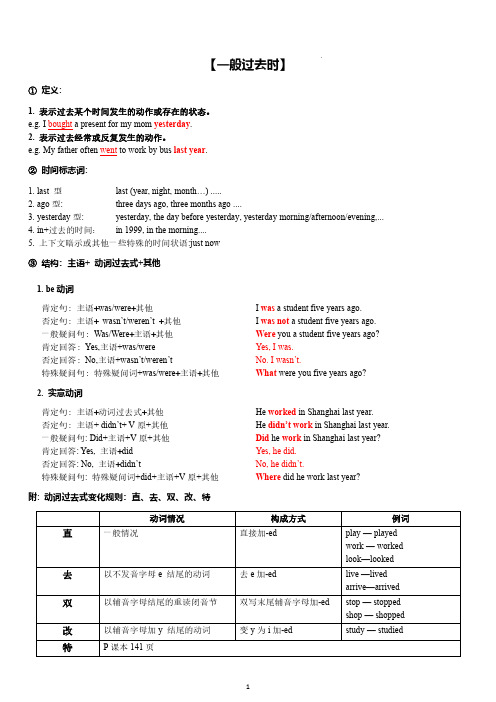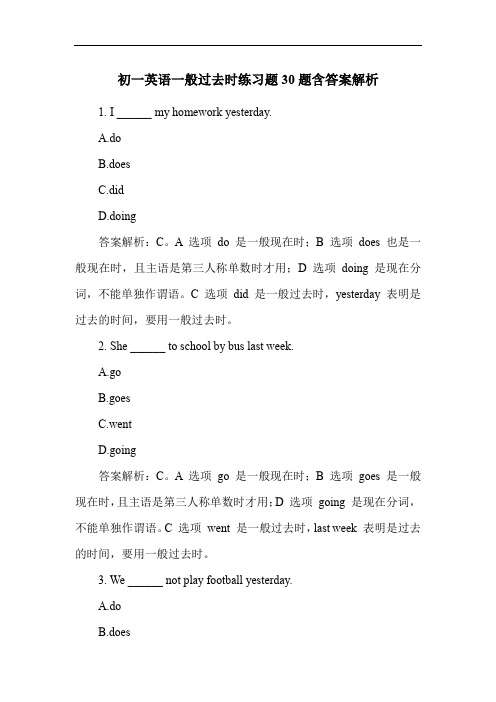七年级英语一般过去时详细讲解与练习题学生版
(完整版)初中一般过去时详细讲解与练习

(完整版)初中一般过去时详细讲解与练习1. 什么是一般过去时?一般过去时是英语中用来表示过去发生的动作或状态的一种时态。
它通常用来谈论过去的经历、惯、或者过去的事实。
2. 一般过去时的构成一般过去时的动词构成通常依赖于动词的词尾。
下面是一般过去时的构成规则:- 对于大多数动词,直接在动词后面加上了"-ed"来构成一般过去时。
例如:walk -> walked,play -> played。
- 对于以不发音的"e"结尾的动词,只需要在"e"后面加上"-d"来构成一般过去时。
例如:like -> liked,love -> loved。
- 对于以辅音字母+y结尾的动词,将"y"变为"i"并加上"-ed"来构成一般过去时。
例如:study -> studied,cry -> cried。
- 部分动词的一般过去时需要进行不规则变化。
例如:go -> went,eat -> ate。
3. 一般过去时的用法一般过去时通常用来描述以下情况:- 过去发生的动作:I walked to school yesterday.- 过去的经历:He lived in London for five years.- 过去的事实:She was a teacher in the past.4. 一般过去时的句型练下面是一些练,帮助加深对一般过去时的理解和运用:1. 请用一般过去时填空:Yesterday, I ________ (watch) a movie at home.2. 完成句子:He _____ (visit) his grandparents last summer.3. 改写句子,使用一般过去时:I read a book yesterday. (改为否定句)4. 改写句子,使用一般过去时:They played basketball in the park. (改为疑问句)5. 总结一般过去时是用来表示过去发生的动作或状态的一种时态。
七年级英语∶英语一般过去时专练及答案解析推荐精选

七年级英语∶英语一般过去时专练及答案解析推荐精选一、初中英语一般过去时1.—Have you ever climbed Mount Tai, Carol?—Yes. I ______ in Taian for a week last year and reached the top of it twice.A. had stayedB. stayC. stayedD. have stayed【答案】C【解析】【分析】句意:--卡罗,你曾经爬过泰山吗?--是的,我去年在泰安呆了一周,并且两次到达山顶。
last year,去年,过去的时间,又and连接的是两个并列的动作,所以应该用一般过去时态的。
had stayed,过去完成时态;stay,一般现在时;stayed一般过去时;have stayed,现在完成时,结合句意,故选C。
【点评】考查时态辨析,last+时间是一般过去时的标志词之一。
2.The old man _________________ Bajin was a famous writer.A. was calledB. is calledC. calledD. calls【答案】 C【解析】【分析】句意:老人巴金是一位著名的作家。
谓语动词是was,故此处缺少非谓语动词,call与man是被动关系,故是过去分词用后置定语,故选C。
【点评】考查非谓语动词,注意过去分词的用法。
3.A bridge ________over the river last year.A. buildsB. builtC. was builtD. is built【答案】 C【解析】【分析】句意:去年河上建了一座桥。
主语是谓语的执行者时,用主动语态,主语是谓语的承受者时,用被动语态。
a bridge是谓语build的承受者,用被动语态;表示在last year发生的过去动作,用一般过去时态,故选C。
4.They don't live here any longer. They _______ to Chengdu last month.A. moveB. movedC. will moveD. are moving【答案】B【解析】【分析】句意:他们不再住在这里了。
人教版英语七年级英语∶英语一般过去时专练含解析

人教版英语七年级英语∶英语一般过去时专练含解析一、初中英语一般过去时1.—Where did you go last winter vacation?—I ________ to London with my family.A. goB. have goneC. wentD. was going【答案】 C【解析】【分析】句意:——去年寒假你去哪里了?——我和家人去了伦敦。
A.一般现在时;B.现在完成时;C.一般过去时;D.过去进行时。
did表明时态是一般过去时,所以回答用一般过去时,故选C。
【点评】考查一般过去时,注意问句和答句时态一致,故选C。
2.– When did you _________ into this new house?— Well, I _________ here for a month.A. move, liveB. moved, livedC. moved, have livedD. move, have lived【答案】 D【解析】【分析】句意:—你什么时候搬到这个新房子的?—好的,我已经在这住了一个月了。
根据上文是对一般过去的提问,可知用一般过去时态,根据语境下文应该用现在完成时来回答。
根据题意故选D。
3.A bridge ________over the river last year.A. buildsB. builtC. was builtD. is built【答案】 C【解析】【分析】句意:去年河上建了一座桥。
主语是谓语的执行者时,用主动语态,主语是谓语的承受者时,用被动语态。
a bridge是谓语build的承受者,用被动语态;表示在last year发生的过去动作,用一般过去时态,故选C。
4.He___________ his grandparents in the countryside last week.A. visitsB. visitC. visited【答案】C【解析】【分析】句意:上周,他拜访了在农村的祖父母。
1、学生讲解习题(一般现在时一般过去时、一般将来时部分)

.概念:①;②;③。
(1)be型:句子的谓语动词只有be(am,is或are):a.肯定句中,只出现be,如:I am a student.我是一名学生。
b.否定句中,c.一般疑问句,(2)实义动词型:a.肯定句中,只出现实义动词,如:I get up in the morning.b.否定句中,every…, sometimes, at…, on Sunday2) 客观真理,客观存在,科学事实。
Shanghai lies in the east of China.3) 表示格言或警句中。
Pride goes before a fall. 骄者必败。
4) 现在时刻的状态、能力、性格、个性。
I don't want so much.现在一般时动词变化的规则是:1.如果主语是名词复数和第一人称I、we ,谓语动词不用做任何变化,2.主语是任何一个单数名词或者是第三人称单数,谓语动词要进行必要的变化。
特别提一点:不可数名词也算作单数处理。
3.谓语动词的变化规律是:(1) 在动词后加-s,-es read - reads,write - writes,say - says(2) 以s,x,ch,sh 结尾的词加-es teach - teaches,wash - washes,(3) 以辅音字母+y结尾的词变y为i再加-es try - tries,carry – carries(4) 特殊变化的词be (是) - am, is, are (I am she/he/it,名词单数都用is ,we, you, they, 名词复数都用are have (有) - have, has I, we, you, they, 名词复数都用have she/he/it is, 名词单数都用has)(5) 助动词,不论单复数、不论什么人称都没有变化,can, may, must, need, ought to 等。
七年级英语一般过去时讲解与练习

【一般过去时】①定义:1.表示过去某个时间发生的动作或存在的状态。
e.g.I bought a present for my mom yesterday.2.表示过去经常或反复发生的动作。
e.g.My father often went to work by bus last year.②时间标志词:st型last(year,night,month…).....2.ago型:three days ago,three months ago....3.yesterday型:yesterday,the day before yesterday,yesterday morning/afternoon/evening,...4.in+过去的时间:in1999,in the morning....5.上下文暗示或其他一些特殊的时间状语:just now③结构:主语+动词过去式+其他1.be动词肯定句:主语+was/were+其他I was a student five years ago.否定句:主语+wasn’t/weren’t+其他I was not a student five years ago.一般疑问句:Was/Were+主语+其他Were you a student five years ago?肯定回答:Yes,主语+was/were Yes,I was.否定回答:No,主语+wasn’t/weren’t No.I wasn’t.特殊疑问句:特殊疑问词+was/were+主语+其他What were you five years ago?2.实意动词肯定句:主语+动词过去式+其他He worked in Shanghai last year.否定句:主语+didn’t+V原+其他He didn’t work in Shanghai last year.一般疑问句:Did+主语+V原+其他Did he work in Shanghai last year?肯定回答:Yes,主语+did Yes,he did.否定回答:No,主语+didn’t No,he didn’t.特殊疑问句:特殊疑问词+did+主语+V原+其他Where did he work last year?附:动词过去式变化规则:直、去、双、改、特动词情况构成方式例词直一般情况直接加-ed play—playedwork—workedlook—looked 去以不发音字母e结尾的动词去e加-ed live—livedarrive—arrived 双以辅音字母结尾的重读闭音节双写末尾辅音字母加-ed stop—stoppedshop—shopped 改以辅音字母加y结尾的动词变y为i加-ed study—studied特P课本141页★即时即练I.写出下列动词的过去式和中文意思1.ride__________________2.feed__________________3.talk__________________4.do___________________5.grow__________________6.learn__________________7.pick__________________8.are__________________9.eat__________________ 10.study_________________11.see__________________12.take_________________ 13.buy__________________14.sleep_________________15.get__________________ 16.meet_________________17.watch_________________18.live__________________ 19.go________________20.dance________________21.write________________ II.句型转换1.Lucy did her homework at home.(改为否定句)Lucy________________her homework at home.2.His father worked all day last Monday.(改为一般疑问句)________his father________all day last Monday?3.I was very busy yesterday.(改为否定句)I________________very busy yesterday.4.There was some orange in the cup.()________there________orange in the cup?5.They went to the movies last Saturday.(对划线部分提问)________________they________last weekend?把下列句子改为否定句、一般疑问句并作肯定、否定回答1.My trip last weekend was excellent.2.The stars were so beautiful at night.3.The farmer showed Carol around the farm.4.We asked him some questions.III.用括号内所给单词的适当形式填空1.Mary and Tom________________(come)to China last month.2.Mike________________(not go)to bed until12o’clock,so he________________(get)up late.3.My cousin________________(read)English book in the living room now.4.I often________________(call)Mike in the morning.5.Tom________________(begin)to learn Chinese last year.6.She________________(visit)the country two years ago.7.The man________________(write)the book in2005.8.She________________(go)into the room because she________________(forget)her key9.I________________(wash)the clothes and________________(clean)the room.10.My mother________________(go)shopping yesterday.11.He________________(be)busy last Sunday,but you________________(be)free.IV.Grammar Focus1.—你学校的旅行怎么样?—太棒啦!________________________________________________________________________________________________? ________________________________________________________________________________________________!2.—你去过动物园了吗?—没有,我去了农场。
(完整版word)七年级英语∶英语一般过去时专练含答案解析

(完整版word)七年级英语∶英语一般过去时专练含答案解析一、初中英语一般过去时1.—Have you ever climbed Mount Tai, Carol?—Yes. I ______ in Taian for a week last year and reached the top of it twice.A. had stayedB. stayC. stayedD. have stayed【答案】C【解析】【分析】句意:--卡罗,你曾经爬过泰山吗?--是的,我去年在泰安呆了一周,并且两次到达山顶。
last year,去年,过去的时间,又and连接的是两个并列的动作,所以应该用一般过去时态的。
had stayed,过去完成时态;stay,一般现在时;stayed一般过去时;have stayed,现在完成时,结合句意,故选C。
【点评】考查时态辨析,last+时间是一般过去时的标志词之一。
2.—I am sorry I _______ my exercise book at home.— Don't forget _______ it to school tomorrow.A. forget; to takeB. left; to bringC. forgot; to bringD. left; to take【答案】A【解析】【分析】forget忘记;leave留下;bring带来;take带走。
句意:抱歉,我把我的练习本忘在家里了。
——明天不要忘了把它带到学校来。
Forget后接动名词表示忘记做过的某事,接不定式是忘记去做某事,结合语境可知上文描述的是刚才发生的动作,故从句谓语动词用过去时态,下文表示不要忘记做某事,选A。
【点评】该题型是属于基础题型,是必考内容。
英语动词同汉语一样具有一词多义,一词多性的特点。
解答此类问题首先要理解每个单词的基本含义,并注意交叉含义间的区别,了解其特殊用法及习惯搭配等特点,然后结合语境选择正确答案。
七年级英语下册 一般过去时讲解与练习

现在进行时态练习题一.写出下列动词的现在分词形式。
help___________ come___________ swim___________ eat ___________ give___________ find _________ sit ___________ write___________ make ___________ play___________ clean _____________ catch___________ walk___________ ride __________ run____________ draw_________listen___________ dance___________ watch___________ sleep__________ see_______ have _______ 二.用所给词的适当形式填空。
1.Look ! The boy ______________________ (read) books.2.The girls __________________ (have) breakfast now.3. —______ he ____________ (clean) the blackboard? —No, he isn’t.4.Tom __________________ (play) football on the playground at the moment .5.Listen! They__________________ (sing) in the muisc room.三.汉译英。
1.我们正在看电视。
We____________________________ TV.2.Tom 在图书馆看书。
Tom ____________________________ books in the library.3.康康在操场上打篮球。
初一英语一般过去时练习题30题含答案解析

初一英语一般过去时练习题30题含答案解析1. I ______ my homework yesterday.A.doB.doesC.didD.doing答案解析:C。
A 选项do 是一般现在时;B 选项does 也是一般现在时,且主语是第三人称单数时才用;D 选项doing 是现在分词,不能单独作谓语。
C 选项did 是一般过去时,yesterday 表明是过去的时间,要用一般过去时。
2. She ______ to school by bus last week.A.goB.goesC.wentD.going答案解析:C。
A 选项go 是一般现在时;B 选项goes 是一般现在时,且主语是第三人称单数时才用;D 选项going 是现在分词,不能单独作谓语。
C 选项went 是一般过去时,last week 表明是过去的时间,要用一般过去时。
3. We ______ not play football yesterday.A.doB.doesC.didD.are答案解析:C。
A 选项do 和B 选项does 都是一般现在时;D 选项are 是be 动词,不能与动词原形play 同时使用。
C 选项did 在这里表示否定,didn't play 是一般过去时的否定形式。
4. Did you ______ your book?A.loseB.losesC.lostD.losing答案解析:A。
B 选项loses 是一般现在时,且主语是第三人称单数时才用;C 选项lost 是过去分词,不能直接放在did 后面;D 选项losing 是现在分词,不能直接放在did 后面。
A 选项lose 是动词原形,did 后面要用动词原形。
5. They ______ happy last Sunday.A.wereB.areC.wasD.is答案解析:A。
B 选项are 和D 选项is 是一般现在时;C 选项was 是be 动词的过去式,但主语they 是复数,要用were。
- 1、下载文档前请自行甄别文档内容的完整性,平台不提供额外的编辑、内容补充、找答案等附加服务。
- 2、"仅部分预览"的文档,不可在线预览部分如存在完整性等问题,可反馈申请退款(可完整预览的文档不适用该条件!)。
- 3、如文档侵犯您的权益,请联系客服反馈,我们会尽快为您处理(人工客服工作时间:9:00-18:30)。
一般过去时详细讲解与练习题(学生版)一、巧记一般过去时:动词一般过去时,表示过去发生的事;be 用was 或用were, have,has 变had ;谓语动词过去式,过去时间作标志;一般动词加-ed ,若是特殊得硬记。
否定句很简单,主语之后didn’t 添;疑问句也不难,did 放在主语前; 不含be动词时如果谓语之前有did ,谓语动词需还原;动词若是was, were,否定就把not 添。
含be 动词时疑问句也不难,要把was ,were 放在主语前。
二、be 的过去时有四巧:一是时间状语巧, 表示过去的短语要记牢;二是形式巧,单数was ,复数were ;三巧是否定句结构,not 紧跟was /were ;四是疑问句式巧,was /were 向前跑(提前)。
【一巧】时间状语(即标志词)巧。
一般过去时表示过去发生的动作或存在的状态,恰巧与表示过去的一些时间状语连用。
【二巧】形式巧。
例如: I was in the classroom yesterday morning . 昨天早上我在教室里。
They were over there a moment ago . 刚才他们在那边。
【三巧】否定句结构巧。
与动词be 的一般现在时一样,它在动词后面加not 即可变成否定句,并且was, were 与not 可以缩写成wasn't, weren't 。
即:主语 + wasn't / weren't + 表语 + 其他。
例如:I was not (=wasn't) here yesterday . 昨天我不在这儿。
My parents were not (=weren't) at home last Sunday .【四巧】 疑问句式巧。
把was, were 提到句首,句末用问号即可变为一般疑问句。
即:Was(Were) + 主语 +表语 + 其他?例如: Were you at home the day before yesterday ﹖ 前天你在家吗?肯定回答用“Yes, 主语+was /were .” Yes, I was.否定回答用“No,主语+wasn't /weren't .” No, I wasn’t.三、一般过去时态精讲1. 用法: ①过去某个时间发生的动作例:His mother made some dumplings yesterday.②过去某个时间存在的状态例:Jim was 12 years old.③过去经常或反复发生的动作例:He often went to swim when he was a child.2. 与一般过去时连用的时间状语常见的有:Yesterday, last night, in 1990, once, two days ago, the day before yesterday ,the other day 几天前3. 一般过去时的四个基本句型4. 动词的过去式和过去分词的规则变化①一般在动词词尾加ed 例: want →wanted②以e结尾的动词,只加d 例: live →lived③以辅音字母加y结尾的动词,改y为i,再加ed 例: study →studied④以重读闭音节结尾,末尾只有一个辅音字母,双写这一辅音字母,再加ed例: stop →stopped一. 单项选择:从下列各题后所给的四个选项中选择最佳答案填空。
( )1.My father______ill yesterday.A.isn't B.aren't C.wasn't D.weren't( )2.______your parents at home last week﹖A.Is B.Was C.Are D.Were( )3.The twins______in Dalian last year.They______here now.A.are; were B.were; are C.was; are D.were; was( )4.__your father at work the day__yesterday(前天)﹖A.Was; before B.Is; before C.Was; after D.Is; after( )5.—Who was on duty last Friday﹖—______.A.I am B.I was C.Yes, I was D.No, I wasn't( )6. I cleaned my classroom ___________.A. with three hoursB. three hours agoC. in three hoursD. three hours before( ) 7. I came _______ my house two days ago .A. back onB. back to C . to back D. back( ) 8 . ___________? He did some reading at home.A. What does your father do yesterday eveningB. What does your brother do in the schoolC. What did your brother do over the weekendD. Where did your brother go last Sunday( ) 9. What did you do ________ ? I went to the movies.A. next morningB. over the weekendC. in the weekendD. next Monday( ) 10. The koala sleeps _______,but gets up _________.A. during the day; at the eveningB. at day ;during nightC. in the day ;during the eveningD. during the day ; at night二、请用正确动词形式填空。
(10)1. I _________ (have) an exciting party last weekend.2. _________ she _________(practice) her guitar yesterday?No, she _________.3. What ________ Tom ________ (do) on Saturday evening?He ________(watch) TV and __________(read) an interesting book.4. They all _________(go) to the mountains yesterday morning.5. She _________(not visit) her aunt last weekend.She ________ (stay) at home and _________(do) some cleaning.6. When ________ you _________(write) this song?I __________(write) it last year.7. My friend, Carol, ________(study) for the math test and ________(practice) English last night.8. ________ Mr. Li __________(do) the project on Monday morning?Yes, he _________.9. How _________(be) Jim's weekend? It _________(be not) bad.10. ________ (be) your mother a sales assistant last year? No, she __________.三、翻译下列句子(20)1. 我过了一个忙碌但却刺激的周末。
I _______ ________ _________ _________ exciting weekend.2. Jenny喜欢看书。
昨晚她看了一本英语书。
Jenny likes ________ _________. She _______ an English book last night.3. Emma每天都看电视。
可是昨天他没有看。
Emma_________ TV every day. But he ________ _______ _______ yesterday.4. 上周六他们做什么了?他们做作业和购物了。
What ________ they _________ _________ Saturday?They ________ _________ homework and ________ _________.5. 今天早上方方得做饭,因为他父亲不在家。
This morning Fangfang ____ ____ ____ ____ because his father _____ _____ ____ yesterday.6. 你还有什么要说的?What _______ would you like _______ _______?7. 放学别忘了向老师说声再见。
Don’t forget ______ _______ _______ _______ the teacher.8. 为什么你昨晚没有看电视?Why _______ you _______ TV last night?9. 他在打扫教室的时候,发现地上有块表。
When he ______ the classroom, he ______ a watch on the ground.10. 他什么时候出生的?1980年。
---When _______ he _______? ---_______ 1980.四、改写句子:(20)1、Lucy did her homework at home.(改否定句)Lucy ________ _______ her homework at home.2、He found some meat in the fridge(冰箱).(变一般疑问句)__________ he __________ ___________ meat in the fridge?3、There was some orange in the cup.(变一般疑问句)_______ there _______ orange in the cup?4. Frank read an interesting book about history. (一般疑问句)_______ Frank _______ an interesting book about history?5. Why not go out for a walk? (同义句)_______ ________ ________ out for a walk?6. Thomas spent RMB 10 on this book. (否定句)Thomas______ _____RMB 10 on this book.7. My family went to the beach last week. (划线提问)________ ________ ________ family _______ last week?8. I think she is Lily’s sister. (否定句)I ______ think she _____ Lily’s sister.9. Sally often does some reading in the morning. (否定句)Sally _______ often ______ some reading in the morning.10.He is a tall, thin boy. (划线提问)_______ _______ he _______ ________?五、改错题(20)1.How is Jane yesterday? _____________________2.He go to school by bus last week. ____________________________3.He often goes home at 6:00 last month. ____________________________4.I can fly kites seven years ago. ______________________________5.Did you saw him just now. ____________________________________6.Tom wasn’t watch TV last night. ____________________________________7.I didn’t my homework yesterday. ____________________________________8.He wait for you three hours ago. ____________________________________9.Who find it just now ? ________________________________________10.What make him cry (哭) just now? _________________________________六、完形填空(10)Tom did not like doing his homework,because he liked to do some 1 things after school.And his teacher always 2 a lot of mistakes in his homework.Then one day,his maths teacher 3 at Tom’s homework and saw that he got all his answers right.He was very 4 and surprised(惊奇).The next morning before class,he called Tom 5 his desk and 6 to him,“You got all your homework right this time.Did your father help you?”Sometimes Tom’s father helped him with his homework,7 this time he didn’t help Tom because he 8 at home.So Tom answered,“NO,Sir.He Was busy last night,so I 9 to do it 10 .”()1.A.others B.another C.the other D.other()2.A.made B.found C.looked at D.looked()3.A.laughed B.knocked C.looked D.saw()4.A.please B.pleased C.pleasure D.sad()5.A.to B.for C.in D.at()6.A.talked B.asked C.spoke D.said()7.A.and B.but C.so D.or()8.A.isn’t B.won’t be C.wasn’t D.can’t be()9.A.wanted B.mustn’t C.liked D.had()10.A.itself B.of them C.myself D.himself。
